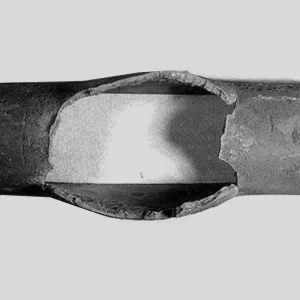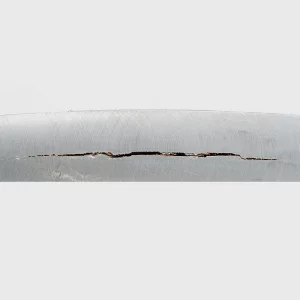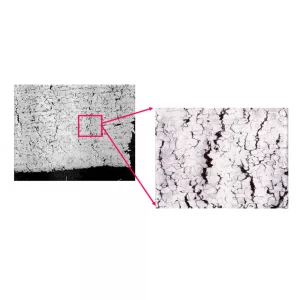Poor design or inadequate materials selection can lead to long-term overheating in boiler tubes. This can occur due to factors such as inadequate consideration of temperature and pressure conditions, or improper material selection.
Boilers are vital components of various industries, providing heat and power generation. However, they are susceptible to failures and corrosion risks that can compromise their efficiency, safety, and longevity. It is crucial to have a comprehensive understanding of these issues to prevent costly breakdowns, downtime, and potential hazards.
Boiler failures can occur due to multiple factors, including hydrogen damage, caustic gouging, oxygen attack, thermal fatigue, and flow-assisted corrosion. Each of these mechanisms poses unique challenges and requires specific preventive measures.
HYDROGEN DAMAGE:
Hydrogen damage in boilers refers to a type of corrosion caused by the presence of hydrogen gas.
✔️ Process
When hydrogen gas enters the boiler system, it can react with the metal surfaces, leading to degradation and weakening of the materials over time.
✔️ Result
This can result in cracks, embrittlement, and ultimately, failure of the boiler tubes.
✔️ Generation Mechanism
Hydrogen damage is a significant concern in high-temperature environments, particularly in boilers where hydrogen can be generated through various mechanisms, such as steam decomposition or chemical reactions involving fuels or water.
Damages:
a) Thick-lipped
- Thick-lipped damage refers to the formation of raised lips or edges along the fracture surface of boiler tubes caused by hydrogen damage.
- This type of damage typically occurs due to hydrogen-induced cracking, where hydrogen gas diffuses into the metal and promotes the formation of cracks.
- Over time, the cracks grow and eventually result in thick-lipped fractures, which can be visually observed as raised edges or lips along the fracture surface.

b) Brittle Appearance
- When hydrogen penetrates the metal structure, it can cause embrittlement, making the material more prone to fracture.
- This embrittlement can result in a distinct brittle appearance of the affected areas.
- Instead of displaying ductile or flexible characteristics, the material appears more rigid and prone to sudden failure.

c) Window Section Blown Out
- This refers to the occurrence of localized ruptures or blowouts in the affected boiler tube sections.
- As hydrogen-induced cracks propagate and worsen, they can eventually reach a critical point where the pressure inside the tube causes a rupture, leading to the expulsion or blowing out of a section, creating a visible window-like opening.

PREVENTIVE MEASURE:
Preventive measures against hydrogen damage in boiler tubes involve implementing various practices to minimize the risk of hydrogen ingress and mitigate its detrimental effects. Here are some key preventive measures.
✔️ Deaeration
Effective deaeration systems should be in place to remove dissolved gases, including oxygen and hydrogen, from the feedwater. Deaeration helps minimize the amount of hydrogen that can potentially enter the boiler system.
✔️ Material Selection
Choose appropriate materials for boiler tubes that are resistant to hydrogen damage. Select materials that have a high tolerance for hydrogen exposure and possess suitable mechanical properties to withstand the operational conditions.
✔️ Hydrogen Monitoring
Regularly monitor the concentration of hydrogen gas within the boiler system using appropriate monitoring techniques. Early detection of increased hydrogen levels can prompt proactive measures and prevent extensive damage.
✔️ Maintenance and Inspections
spections Conduct regular inspections and maintenance activities to identify potential sources of hydrogen generation and address any existing damage promptly. This includes inspecting for leaks, addressing water chemistry issues, and assessing the integrity of boiler tubes.
✔️ Operational Control
Optimize boiler operating parameters, such as temperature and pressure, to minimize the potential for hydrogen damage. Proper control and monitoring of operational conditions can help mitigate the risk of hydrogen-related issues.
✔️ Training and Education
Ensure that operators and maintenance personnel are well-trained and knowledgeable about hydrogen damage prevention. Provide education on best practices, safety protocols, and the significance of proactive measures.
CONCLUSION:
In conclusion, understanding boiler failures and corrosion risks is crucial for maintaining the efficiency, safety, and longevity of boiler systems in various industries. Among the different mechanisms that contribute to boiler failures, hydrogen damage poses a significant concern, resulting in cracks, embrittlement, and failure of boiler tubes.
Solarkaz provides its expertise to the clients by implementing the preventive measures, industries can minimize the risk of hydrogen damage, ensuring the safe and efficient operation of boiler systems, reducing downtime, and preventing costly breakdowns.
Solarkaz through its continuous vigilance, and proactive measures, can safeguard boilers against hydrogen damage and extend their lifespan, enabling uninterrupted heat and power generation while maximizing the potential of these vital components. You can contact us for having a deep understanding on Hydrogen Damage.

